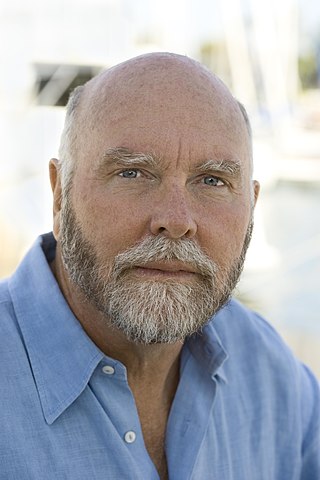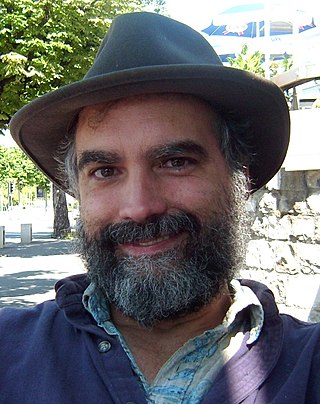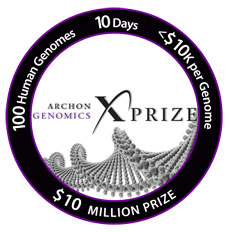
John Craig Venter is an American biotechnologist and businessman. He is known for leading one of the first draft sequences of the human genome and assembled the first team to transfect a cell with a synthetic chromosome. Venter founded Celera Genomics, the Institute for Genomic Research (TIGR) and the J. Craig Venter Institute (JCVI). He was the co-founder of Human Longevity Inc. and Synthetic Genomics. He was listed on Time magazine's 2007 and 2008 Time 100 list of the most influential people in the world. In 2010, the British magazine New Statesman listed Craig Venter at 14th in the list of "The World's 50 Most Influential Figures 2010". In 2012, Venter was honored with Dan David Prize for his contribution to genome research. He was elected to the American Philosophical Society in 2013. He is a member of the USA Science and Engineering Festival's advisory board.
In genetics, shotgun sequencing is a method used for sequencing random DNA strands. It is named by analogy with the rapidly expanding, quasi-random shot grouping of a shotgun.

The human genome is a complete set of nucleic acid sequences for humans, encoded as DNA within the 23 chromosome pairs in cell nuclei and in a small DNA molecule found within individual mitochondria. These are usually treated separately as the nuclear genome and the mitochondrial genome. Human genomes include both protein-coding DNA sequences and various types of DNA that does not encode proteins. The latter is a diverse category that includes DNA coding for non-translated RNA, such as that for ribosomal RNA, transfer RNA, ribozymes, small nuclear RNAs, and several types of regulatory RNAs. It also includes promoters and their associated gene-regulatory elements, DNA playing structural and replicatory roles, such as scaffolding regions, telomeres, centromeres, and origins of replication, plus large numbers of transposable elements, inserted viral DNA, non-functional pseudogenes and simple, highly repetitive sequences. Introns make up a large percentage of non-coding DNA. Some of this non-coding DNA is non-functional junk DNA, such as pseudogenes, but there is no firm consensus on the total amount of junk DNA.

Eric Steven Lander is an American mathematician and geneticist who is a professor of biology at the Massachusetts Institute of Technology (MIT), and a professor of systems biology at Harvard Medical School. Eric Lander is founding director emeritus of the Broad Institute of MIT and Harvard.

Medicago truncatula, the barrelclover, strong-spined medick, barrel medic, or barrel medick, is a small annual legume native to the Mediterranean region that is used in genomic research. It is a low-growing, clover-like plant 10–60 centimetres (3.9–23.6 in) tall with trifoliate leaves. Each leaflet is rounded, 1–2 centimetres (0.39–0.79 in) long, often with a dark spot in the center. The flowers are yellow, produced singly or in a small inflorescence of two to five together; the fruit is a small, spiny pod.

The J. Craig Venter Institute (JCVI) is a non-profit genomics research institute founded by J. Craig Venter, Ph.D. in October 2006. The institute was the result of consolidating four organizations: the Center for the Advancement of Genomics, The Institute for Genomic Research (TIGR), the Institute for Biological Energy Alternatives, and the J. Craig Venter Science Foundation Joint Technology Center. It has facilities in Rockville, Maryland and San Diego, California.

Human Genome Sciences (HGS) was a biopharmaceutical corporation founded in 1992 by Craig Venter, Alan Walton and Wally Steinberg. It uses the human DNA sequence to develop protein and antibody drugs. It had drugs under development to treat such diseases as hepatitis C, systemic lupus erythmatosis, anthrax, and cancer. It collaborated with other biotechnology and pharmaceutical companies for development partnerships and licensing.
The National Human Genome Research Institute (NHGRI) is an institute of the National Institutes of Health, located in Bethesda, Maryland.

William James Kent is an American research scientist and computer programmer. He has been a contributor to genome database projects and the 2003 winner of the Benjamin Franklin Award.

The Influenza Genome Sequencing Project (IGSP), initiated in early 2004, seeks to investigate influenza evolution by providing a public data set of complete influenza genome sequences from collections of isolates representing diverse species distributions.
The Baskin School of Engineering, known simply as Baskin Engineering, is the school of engineering at the University of California, Santa Cruz. It consists of six departments: Applied Mathematics, Biomolecular Engineering, Computational Media, Computer Science and Engineering, Electrical and Computer Engineering, and Statistics.
Tracking stock, also known as letter stock and targeted stock, is a specialized equity offering issued by a company that is based on the operations of a defined business within the larger organization. Therefore, the tracking stock will be traded at a price related to the operations of the specific division of the company being "tracked". Tracking stock is typically limited, or has no voting rights. Often, tracking stock is issued to separate a high-growth division from its parent company, while the parent company and its shareholders remain in control of the subsidiary's operations.

The Human Genome Project (HGP) was an international scientific research project with the goal of determining the base pairs that make up human DNA, and of identifying, mapping and sequencing all of the genes of the human genome from both a physical and a functional standpoint. It started in 1990 and was completed in 2003. It remains the world's largest collaborative biological project. Planning for the project started after it was adopted in 1984 by the US government, and it officially launched in 1990. It was declared complete on April 14, 2003, and included about 92% of the genome. Level "complete genome" was achieved in May 2021, with only 0.3% of the bases covered by potential issues. The final gapless assembly was finished in January 2022.

Claire M. Fraser is an American genome scientist and microbiologist who has worked in microbial genomics and genome medicine. Her research has contributed to the understanding of the diversity and evolution of microbial life. Fraser is the director of the Institute for Genome Sciences at the University of Maryland School of Medicine in Baltimore, MD, where she holds the Dean's Endowed Professorship in the School of Medicine. She has joint faculty appointments at the University of Maryland School of Medicine in the Departments of Medicine and Microbiology/Immunology. In 2019, she began serving a one-year term as President-Elect for the American Association for the Advancement of Science (AAAS), which will be followed by a one-year term as AAAS president starting in February 2020 and a one-year term as chair of the Board of Directors in February 2021.

The Archon Genomics X PRIZE presented by Express Scripts for Genomics, the second X Prize offered by the X Prize Foundation, based in Playa Vista, California, was announced on October 4, 2006 stating that the prize of "$10 million will be awarded to the first team to rapidly, accurately and economically sequence 100 whole human genomes to an unprecedented level of accuracy." The 30 day evaluation phase of the competition to begin on September 5, 2013, was canceled August 22, 2013 and this cancellation was debated on March 27, 2014.
Applied Biosystems is one of various brands under the Life Technologies brand of Thermo Fisher Scientific corporation. The brand is focused on integrated systems for genetic analysis, which include computerized machines and the consumables used within them.
Applera Corporation of Norwalk, Connecticut, at #874 on the 2007 Fortune 1000 list, was one of the largest international biotechnology companies based in the United States. It was the successor company to what was the Life Sciences Division of Perkin-Elmer Corporation. Applera was not publicly traded, but instead it consisted of two major groups which are publicly traded tracking stocks in the proteomics industrial sector. These two groups were the S&P 500 listed Applera Corp-Applied Biosystems Group of Foster City, California, and Applera Corp-Celera Genomics Group of Rockville, Maryland. In 2006, the company spun off the Celera Genomics group and changed its name from Applera to Applied Biosystems.

Whole genome sequencing (WGS) is the process of determining the entirety, or nearly the entirety, of the DNA sequence of an organism's genome at a single time. This entails sequencing all of an organism's chromosomal DNA as well as DNA contained in the mitochondria and, for plants, in the chloroplast.

The $1,000 genome refers to an era of predictive and personalized medicine during which the cost of fully sequencing an individual's genome (WGS) is roughly one thousand USD. It is also the title of a book by British science writer and founding editor of Nature Genetics, Kevin Davies. By late 2015, the cost to generate a high-quality "draft" whole human genome sequence was just below $1,500.












